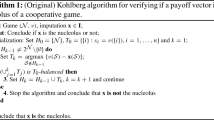Abstract
The consequences of the worst-case assumption NP=P are very well understood. On the other hand, we only know a few consequences of the analogous average-case assumption “NP is easy on average.” In this paper we establish several new results on the worst-case complexity of Arthur-Merlin games (the class AM) under the average-case complexity assumption “NP is easy on average.”
-
–
We first consider a stronger notion of “NP is easy on average” namely NP is easy on average with respect to distributions that are computable by polynomial size circuit families. Under this assumption we show that AM can be derandomized to nondeterministic subexponential time.
-
–
Under the assumption that NP is easy on average with respect to polynomial-time computable distributions, we show (a) AME=E where AME is the exponential version of AM. This improves an earlier known result that if NP is easy on average then NE=E. (b) For every c>0, \(\mathrm{AM}\subseteq [\mbox{\small io-pseudo}_{\mathrm{NTIME}(n^{c})}]\mathrm{-}\mathrm{NP}\) . Roughly this means that for any language L in AM there is a language L′ in NP so that it is computationally infeasible to distinguish L from L′.
We use recent results from the area of derandomization for establishing our results.
Similar content being viewed by others
References
Arvind, V., Köbler, J.: New lowness results for ZPPNP and other complexity classes. J. Comput. Syst. Sci. 65(2), 257–277 (2002)
Babai, L.: Trading group theory for randomness. In: Proc. 17th Annual ACM Symp. on Theory of Computing, pp. 421–429 (1985)
Babai, L., Moran, S.: Arthur-merlin games: a randomized proof system, and a hierarchy of complexity class. J. Comput. System Sci. 36(2), 254–276 (1988)
Babai, L., Fortnow, L., Nisan, N., Wigderson, A.: BPP has subexponential time simulations unless exptime has publishable proofs. In: Proceedings of the 6th Annual Conference on Structure in Complexity Theory, pp. 213–219 (1991)
Balcázar, J., Diaz, J., Gabarró, J.: Structural Complexity I. Springer, Berlin (1988)
Ben-David, S., Chor, B., Goldreich, O., Luby, M.: On the theory of average case complexity. J. Comput. Syst. Sci. 44(2), 193–219 (1992)
Book, R.: Tally languages and complexity classes. Inf. Control 26, 186–193 (1974)
Buhrman, H.: Resource bounded reductions. PhD thesis, University of Amsterdam (1993)
Buhrman, H., Fortnow, L., Pavan, A.: Some results on derandomization. In: Proceedings of the 20th Annual Symposium on Theoretical Aspects of Computer Science. LNCS, vol. 2607, pp. 212–222 (2003)
Feige, U., Lund, C.: On the hardness of computing permanent of random matrices. In: Proceedings of 24th Annual ACM Symposium on Theory of Computing, pp. 643–654 (1992)
Geske, J., Huynh, D., Seiferas, J.: A note on almost-everywhere-complex sets and separating deterministic-time-complexity classes. Inf. Comput. 92(1), 97–104 (1991)
Gemmel, P., Sudan, M.: Higly resilient correctors for polynomials. Inf. Process. Lett. 43, 169–174 (1992)
Gutfreund, D., Shaltiel, R., Ta-Shma, A.: Uniform hardness vs. randomness tradeoffs for Arth ur-Merlin games. Comput. Complex. 12, 85–130 (2003)
Gurevich, Y.: Average case completeness. J. Comput. Syst. Sci. 42, 346–398 (1991)
Impagliazzo, R., Kabanets, V., Wigderson, A.: In search of an easy witness: exponential time vs. probabilistic polynomial time. J. Comput. Syst. Sci. 65, 672–694 (2002)
Impagliazzo, R.: A personal view of average-case complexity theory. In: Proceedings of the 10th Annual Conference on Structure in Complexity Theory, pp. 134–147. IEEE Computer Society Press (1995)
Impagliazzo, R., Wigderson, A.: P = BPP if E requires exponential circuits: Derandomizing the XOR lemma. In: Proceedings of the 29th ACM Symposium on Theory of Computing, pp. 220–229 (1997)
Kabanets, V.: Easiness assumptions and hardness tests: Trading time for zero error. J. Comput. Syst. Sci. 63(2), 236–252 (2001)
Klivans, A., van Melkebeek, D.: Graph nonisomorphism has subexponential size proofs unless the polynomial-time hierarchy collapses. SIAM J. Comput. 31, 1501–1526 (2002)
Köbler, J., Schuler, R.: Average-case intractability vs. worst-case intractability. Inf. Comput. 190(1), 1–17 (2004)
Levin, L.: Average case complete problems. SIAM J. Comput. 15, 285–286 (1986)
Lipton, R.: New directions in testing. In: Distributed Computing and Cryptography. DIMACS Series in Discrete Mathematics and Theoretical Computer Science, vol. 2, pp. 191–202. American Mathematics Society, Providence (1991)
Nisan, N., Wigderson, A.: Hardness vs randomness. J. Comput. Syst. Sci. 49(2), 149–167 (1994)
Papadimitriou, C.: Computational Complexity. Addison-Wesley, Reading (1994)
Seiferas, J., Fischer, M., Meyer, A.: Separating nondeterministic time complexity classes. J. ACM 25(1), 146–147 (1978)
Shaltiel, R., Umans, C.: Simple extractors for all min-entropies and a new pseudo-random generator. In: 42nd IEEE Symposium on Foundations of Computer Science, pp. 648–657 (2001)
Shaltiel, R., Umans, C.: Pseudorandomness for approximate counting and sampling. In: 20th IEEE Conference on Computational Complexity, pp. 212–226 (2005)
Valiant, L., Vazirani, V.: NP is as easy as detecting unique solutions. In: Proc. 17th ACM Symp. Theory of Computing, pp. 458–463 (1985)
Žák, S.: A Turing machine time hierarchy. Theor. Comput. Sci. 26, 327–333 (1983)
Wang, J.: Average-case computational complexity theory. In: Hemaspaandra, L., Selman, A. (eds.) Complexity Theory Retrospective II, pp. 295–328. Springer, Berlin (1997)
Author information
Authors and Affiliations
Corresponding author
Additional information
A. Pavan research supported by NSF grants CCR-0344817 and CCF-0430807.
N.V. Vinodchandran research supported by NSF grant CCF-0430991, University of Nebraska Layman Award, and Big 12 Fellowship.
Rights and permissions
About this article
Cite this article
Pavan, A., Vinodchandran, N.V. Relations between Average-Case and Worst-Case Complexity. Theory Comput Syst 42, 596–607 (2008). https://doi.org/10.1007/s00224-007-9071-0
Received:
Accepted:
Published:
Issue Date:
DOI: https://doi.org/10.1007/s00224-007-9071-0




